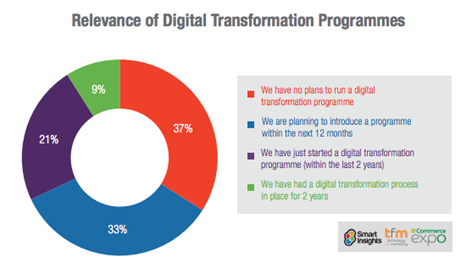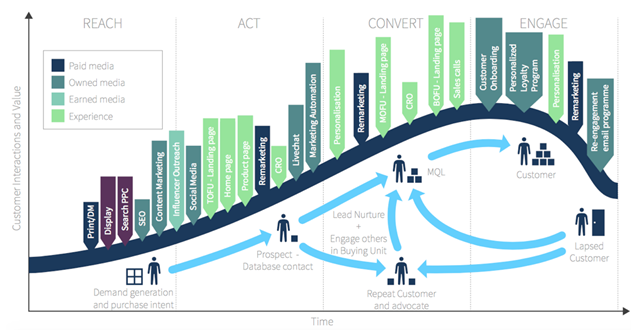In recent years, many medium to large businesses have initiated digital transformation programmes. The Smart Insights Managing Digital Marketing in 2017 research report found that many businesses are actively pursuing Digital Transformation with over one quarter (30%) of businesses already having a transformation programme in place.

A further 33% are planning to start a digital transformation programme within the next 12 months. It's great to see this commitment to a more structured approach to managing the integration of digital marketing into marketing activities, but at the same time, it's surprising that it has taken this long for businesses to make the commitment. The much smaller 9% of businesses that have had a transformation programme in place for 2 years or more will clearly have an edge.
Our research has also identified some common challenges and failings of managing digital marketing, which in my experience become bigger challenges as the organisation becomes larger. In this article I'll take a look at some some recommendations solutions for success to avoid these problems. I will be going into more detail on practical steps businesses can take to manage digital transformation to increase leads and sales in my next Masterclass for the IDM: Practical Digital Transformation. It's a practical workshop, structured around the Smart Insights RACE planning framework, which I developed, so it covers the full customer lifecycle shown here.

By its very nature, successful digital transformation requires significant changes to diverse parts of the business including marketing, technology, culture, structure and team skills.
5 practical success factors for transformation
These are some of the common success factors, which cover some of the techniques we will review in the workshop.
1. Focus on creating value for the business
There is a risk that the scope of digital transformation is focused first-and-foremost on technology since enabling improved processes and sales and marketing techniques through technology is a driver for transformation.
However, with this article suggesting 84% of businesses fail at transformation, I believe it's vital to start with the business goals of transformation it will deliver.
This means that projects should start with creating models to show how conversion to lead and sale (both online and offline) should be increased. It also means having the right dashboards and business KPIs to ensure you can review the project is delivering on the anticipated benefits in different parts of the business.
2. Customer focus
Again, to emphasise that deploying technology is not the main driver, it's important to show how transformation will benefit the customer. Some of the techniques we will consider in the workshop that can help here include:
- Researching personas and operationalizing them
- Customer conversion and loyalty driver research
- Customer journey and content mapping
- Updating your brand online value proposition
3. Integrated communications focus
Other research we have recently completed on online audience engagement shows that one of the biggest challenges in improving the customer experience, content marketing and lifecycle communications is integration of communications. So creating effective 'always-on' communications and campaign plans is important here. Otherwise there is the risk that the activities shown in the lifecycle visual above will be missed.
In the workshop we will look at how to use a detailed 25 point breakdown of the Smart Insights RACE planning framework to improve communications planning.
4. Integrated data focus
Much research has shown that, although as marketers we talk about the benefits of a 'single customer view' and '360 degree customer view', these are difficult to achieve in practice.
This is where making the right marketing technology calls is correct, as part of transformation, reviewing your martech stack and creating a long-term plan for effective investment in technology to achieve a 360 degree view will be part of your aim. But it shouldn't be the starting point.
5. Change management focus.
The figures for the failure rates of transformation projects are similar to those I have seen for other marketing initiatives enabled by technology; CRM implementation failure rates spring to mind. I think this highlights challenges with the scale of the project and change management used.
This new research from the McKinsey in July sheds light on the types of challenges according to a survey of senior respondents in large businesses. It's useful since it highlights the main risks that need to be managed in a transformation project. The biggest challenge featured as the headline and recommendations of the McKinsey article is not digital-specific, but relevant to any large change management project, i.e. Cultural and Behavioural changes.
While we won't look at change management, as such, in the workshop. Clearly, as the name implies, digital transformation is much larger than implementing a single technology, but requires wholesale changes to processes, structure. human and agency resources, measurement, media spend, data management as we have discussed. This is why it's important that a proper organisation-wide change programme is in place which is endorsed and supported by the senior management team and it is not managed by marketing, IT or Sales alone. A long-term roadmap is needed to make sure that small steps are taken so that incremental change can deliver benefits for more effective and efficient communications at each part of the lifecycle
Learn more with the IDM's Digital Marketing Transformation course.
Did you find this blog useful?
At the IDM we are passionate about educating marketers and providing resources to help advance your career.
If you are interested in enhancing your CV and upskilling, browse through our wider range of marketing courses and qualifications; from one-day short courses to post-graduate diplomas.
Our learning and development team will be happy to advise based on your needs and requirements.
